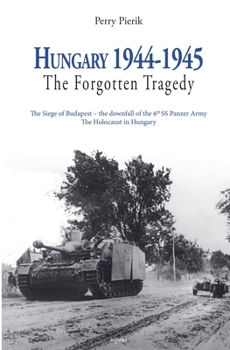Hongarije 1944-1945
The book describes Hungary during World War II on the basis of Hitler's most important political principles, namely the acquisition of 'Lebensraum' (Living space) in which raw materials, oil in particular, were vital. Another tragic subject discussed is the destruction of the last remaining Jewish community in Europe.
The author considers the case of Hungary to be the final manifestation of a long an tragic policy. At the end of the war, Hitler was obsessed by the Hungarian oilfields near Nagykanisza, the last natural oil reserves of the Third Reich. This thoroughly influenced Hitler's strategy and involved enormous military efforts. In January 1945, the Army Group South started an offensive, know as the three Operations Konrad, followed by Operation S dwind in February and the large scale and mostly forgotten Operation Fr hlingserwachen, also known as the Ardennes Offensive of the East in spring. During the last months of the war, Hitler ordered the 6th SS Panzer Army from the Ardennes to Hungary, and Budapest was sacrificed as a 'Festung' (stronghold). The aim of the operations was not only the preservation of the Hungarian oilfields, but also the recaptures of the Romanian oilfields. The operation developed dramatically. Ten days after the beginning of Fr hlingswachen, the Red Army started the Vienna operation and broke trough the German front.
Another tragedy is the extradition of the Hungarian Jews, the last remaining Jewish community in Europe, by SS-commander Adolf Eichmann, who claimed the Hungarian operation to be the most successful one in his career. The author thoroughly investigated how at the end of the war such an extensive destruction campaign could still have taken place. While the SS appeared to be prepared to come to an agreement to spare Jews in Western Europe, most Hungarian Jews died in Auschwitz or during marches to Hegyeshalom. The dubious part played by the Hungarian authorities, Horthy an Sz lasi, and the rescue attempts by Wallenberg, Kastner, Lutz and Perlasca, are also investigated.
This book is a political an military study, focussing largely on the economic politics of the Third Reich, wich have been neglected in historiography. Research has been based on thousands of documents from German, American and Hungarian archives.
Related Subjects
History




